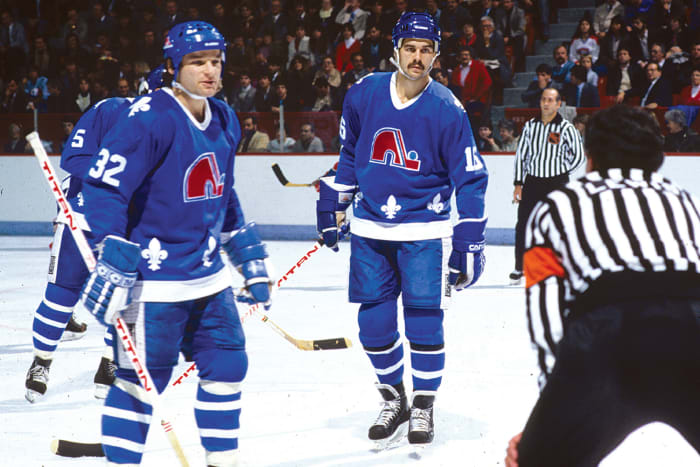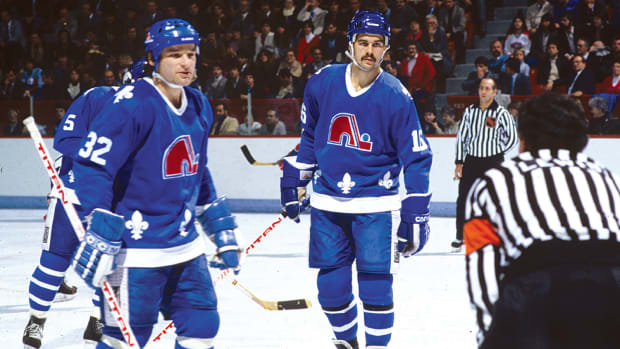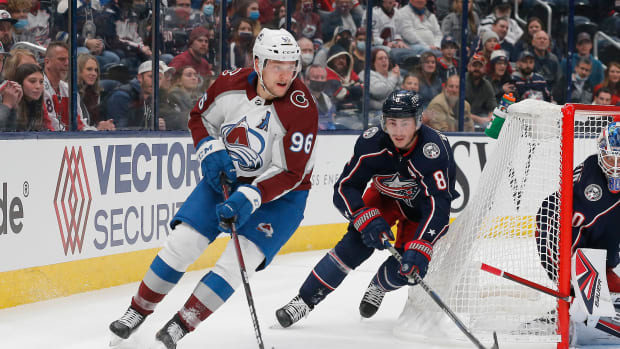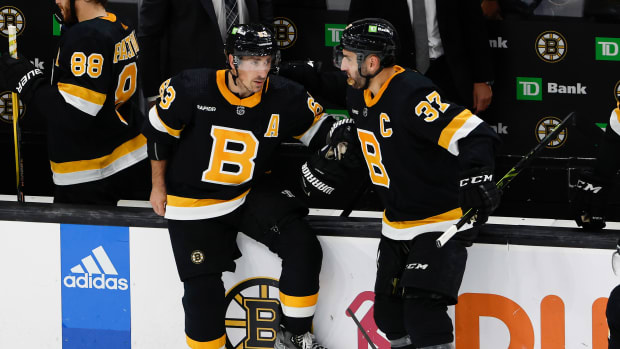The Quebec Nordiques legend doesn’t always get recognized in Colorado, but that’s fine. He’s happy with his place in hockey history, with more goals than Beliveau and two ‘unreal’ Canada Cups. And the parades are fun, too.
Mike Chambers spoke with Michel Goulet in the Conversations with Legends collector’s edition of The Hockey News magazine. It’s available for free with a new subscription to The Hockey News at THN.com/free.
The Hockey News: You were part of the Stanley Cup parade in Denver last summer. Who invited you, and what was that experience like?
Michel Goulet: The parade was awesome. Inviting me were the alumni, John-Michael Liles and Rick Berry. It included Milan Hejduk, Scott Parker, Kyle Quincey, John Mitchell. We all rode together.
THN: How did that parade compare to the first two as an Avalanche executive in 1996 and 2001?
MG: Oh, it was totally different. When you’re part of a team, you help build the team and make all the changes we made, and ending up winning is totally different. You work all year for this, to win a Stanley Cup, and when you do it, you realize how hard it is.
THN: What are some of your best memories from the celebrations in 1996 in 2001?
MG: The ’96 run was just amazing because it was the first year here, and the fact that everything was new, it was the first championship for the city of Denver. The excitement of the fans and you realize how many lives you touched. There was hardly a hockey rink in Denver. All of a sudden, 20 years later, we have rinks everywhere, because kids want to play. In 2001, you got Joe Sakic, Patrick Roy, Peter Forsberg, Ray Bourque, Rob Blake, Adam Foote…the team was so jacked up. I always say when you have six or seven Hall of Famers on one team, you win. When you look back between 1996 and 2001, we could’ve easily won three or four Cups. I know it’s easy to say, but that’s the team we had.
THN: You played in the 1992 Stanley Cup final with Chicago against the Penguins, after the Blackhawks acquired you at the trade deadline from Quebec in 1990. What do you remember most about that run?
MG: We couldn’t match up with Mario Lemieux and Jaromir Jagr. That was a great time. We had some good players: Jeremy Roenick, Steve Larmer, Chris Chelios, Ed Belfour. Mike Keenan had us working, we were recognized as one of the hardest-working teams. There was only one or two reasons we lost: Jagr and Lemieux. That’s the reason why they won two in a row.
THN: You’re a legendary Nordiques player, but a lot of people here in Colorado don’t know you. Does that bother you?
MG: Zero. What you did, whatever you are, you try your best, and to me, all the other stuff, I’m really comfortable with that. I’m good. When you try your best and you produce and all that, I don’t need to be recognized everywhere.
THN: Your No. 16 sweater was retired in Quebec, and it’s on display at the Hall of Fame, but it’s nowhere to be found in Colorado. Yet the club recognizes your statistics among the franchise’s greatest players. Still no hard feelings?
MG: It’s a decision that the organization made, and that’s it. It doesn’t bother me.
THN: Best team you ever played for?
MG: Canada Cup ’84 and ’87, by far. In 1984, I was 24. Glen Sather was the coach and it was Rick Middleton, Wayne Gretzky and Michel Goulet. That was the line. But ’87 was even bigger. Mike Keenan had different lines. He put Gretzky and Lemieux together with different players. I played with them. I had a better tournament in ’84, but the hype in ’87 was unreal. We ended up beating Sweden in the ’84 final. We beat the Russians in the semis with the great Mike Bossy goal. In ’87, we played the Russians in a best-of-3 final, it was three 6-5 games, and we lost the first game. It was amazing, the thrill to be there. The Russians were so good. Obviously, we liked our chances, and we did win.
THN: What was it like being a French Canadian playing in the Quebec-Montreal rivalry for the first 11 years of your career?
MG: The rivalry with Montreal was always there because of hockey over the previous 60 years. Big city and smaller city. But it really started in my third year, in 1982. We made the playoffs against Montreal. They had a team to go far, and we beat them in the first round. Dale Hunter scored on the first shift of OT in (decisive) Game 5. That was the start of a great rivalry.
THN: How did Montreal fans treat you and other French Canadians from the province?
MG: They didn’t really like me, but they showed a lot of respect. So much attention, the people, the TV. Such an amazing thrill to play against Montreal because us, we had a game on TV once in a while, but Montreal had every game on TV.
THN: And the local media?
MG: I had skin for that. That’s where you build your character. A couple times a year, they destroyed me. But it didn’t really matter to me because I was just that kind of guy, that in my brain, I was so focused and secure on my ability to score and produce.
THN: You outscored Canadiens legend Jean Beliveau by 41 career goals, 548 to 507. What is your best memory of ‘Le Gros Bill’?
MG: I was 12 and we all were there watching Jean Beliveau, waiting for two or three games for him to score his 500th goal. We were all there on a Saturday night against the Minnesota North Stars. Beliveau scored, and, I remember this like yesterday, my mom asked me, “How many goals are you going to score in the NHL?” I said, “As many as Jean Beliveau.” Just like that. My mom said, “Yeah.” In a moment like that, in my brain, there was nothing else.
THN: What helped make you an incredible goal-scorer?
MG: My first year with the Nordiques, I had like 30 breakaways. Couldn’t score on many. And that’s when teammate Marc Tardif said, “Put 60 to 100 pucks between the blueline and red line and go down the wing and shoot.” And the other thing he said was, “Put the puck on the side so you can deke or shoot right away.” So two little things like that, veteran players just tell you once, and for me, for 16 years, I was skating like a half hour, 45 minutes before every practice. All of a sudden, I went from 22 goals to 32 to 42 to 57. I worked so hard at it.
THN: Who’s the best player you played against?
MG: It’s Lemieux and Gretzky. And on top of that, I had the chance to play with both of them. I shouldn’t say this because I’ll never know, but if I had one year with one of those guys, I would’ve scored 100 goals. Just a feel I had when playing with those two guys.
THN: Your career ended at age 34 on March 16, 1994, in Montreal after a violent head collision with the end boards. What do you remember from that accident?
MG: I lost an edge going down the wing. Roenick was going to the net and Larmer was coming late, and all of a sudden, my left skate goes across my body and the boards are right there. I land right in the bottom of the boards. Everything on the right side of my brain, totally gone. Never played after that. From there, it was a big battle. Totally lost all my co-ordination, my strength. I couldn’t even lift 30 pounds.
THN: How many more years do you think you could have played?
MG: I was planning to play at least three more years. But I have zero regrets.



